Review: Cherubini's MEDEA with a Shattering Radvanovsky Opens Met Season, Proving 'Hell Hath No Fury like a Woman Scorned'
Heroine or madwoman? This Medea takes everyone prisoner in McVicar’s new production, including helpless Polenzani in a stellar performance
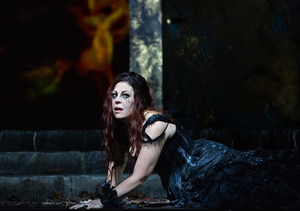
Photo: Marty Sohl/Met Opera
Written over 400 years ago, Cherubini's MEDEA finally made it to the Met on the season's opening night, in a new production by David McVicar. Was it worth the wait? If you take it for Sondra Radvanovsky's performance in the title role, a chilling, a Herculean task, it earns an unqualified yes. She's not afraid to rant and rave, or emit ugly sounds to show off her anger.
And she certainly isn't daunted when her portrayal calls for her to scare the pants off everybody, on stage and off, or kill her children for revenge.
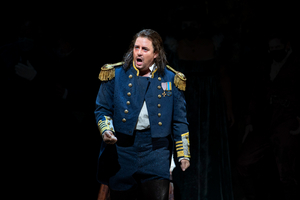
Photo: Marty Sohl/Met Opera
Yet, though there is much talk of her as an "empowered woman," to me at least, she's more unhinged than empowered, as her husband leaves her for another woman and plans to take their two sons with him. This "woman scorned" may have seemed at times to think about whether she would tone down her reaction to her fate, but there didn't really seem to be any doubt about what she would do.
Does that make her a heroine? By this time, this sorceress, this woman has killed her brother and scattered the pieces of his dismembered body in aiding her lover Giasone (tenor Matthew Polenzani) find and take the fabled Golden Fleece.
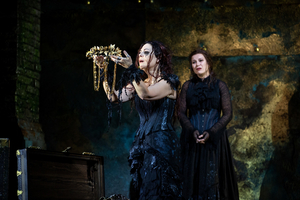
Photo: Marty Sohl/Met Opera
She's already proven the lengths she will go to in order to get what she wants. And she doesn't simply walk a fine line between madness and anger. She's clearly crazy. She makes Lucia di Lammermoor look like 'the sweetheart of Sigma Chi.'
In some ways, this is a one-woman show, because Radvanovsky leaves everyone else in the dust. True, there are other roles and first-rate performances by such singers as the clear-voiced tenor Polenzani as Giasone (that's Jason of the Argonauts) who has deserted her, the cool soprano Janai Brugger as Glauce (Giasone's new intended), the mellow mezzo Ekaterina Gubanova as Neris (Medea's confidante) and profound bass Michele Pertusi as Creonte (king of Corinth and father of Glauce).
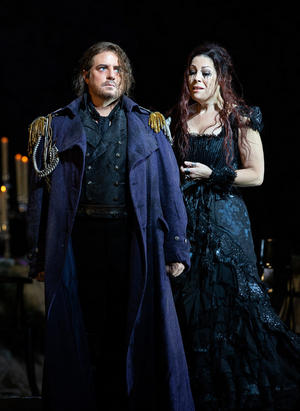
Photo: Marty Sohl/Met Opera
But compared to Radvanovsky's Medea, they are minor to the story, even when they have their own key moments, as each of them does.
Conductor Carlo Rizzi did a shining job with the Met's orchestra, particularly when it called for keeping the manic title character's music under control. And the Met chorus, under Donald Palumbo, did stellar work as well.
They all did their best to get the most out of the score but the score itself often seems too long, and not really serving the story.
The opera was not especially successful at its premiere--in French, since Cherubini worked much in Paris--and the original spoken dialogue (as was used at the Opera Comique) between arias was replaced with music that was not always useful in moving the story along. (And now, of course, it is usually sung in Italian.) Indeed, I found the overture way too long, without giving enough of a preview of what was to come, either musically or dramatically.
Director McVicar also did the sets, with projections by S. Katy Tucker and lighting by Paule Constable, proving once again that he believes "too much is never enough."
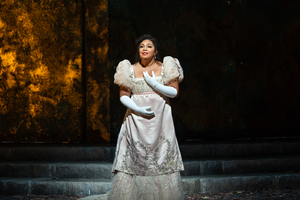
Photo: Marty Sohl/Met Opera
He came up with a brilliant use of mirrors to give more than one view of what was going on onstage, but, like a dog with a bone, he wouldn't let go of it, even when the device was not really called for. (The ending, where Medea sets the temple on fire, might have benefitted from a little cutting.) And I wonder what the production looked like from the upper tiers of the opera house, because even in the Grand Tier, parts of the mirrored set's view of the action was cut off.
Costume designer Doey Luthi added some impressive touches to the action.
Still, when all is said and done, the evening was a triumph for soprano Radvanovsky, and the audience received a season-opener that they won't forget. How often does that happen?
Performances of MEDEA will continue through October 28. For more information on the opera and tickets, see the Met's website.
Reader Reviews

Videos

